- Home
- Linda Byler
Christmas Visitor Page 3
Christmas Visitor Read online
Page 3
School sewing, though, was on top of Ruth’s list. It glared at her from beneath the square silver magnet on the refrigerator—the yellow slip of paper where she had written what she needed. Ten yards of Swedish knit, three yards of black apron material, shirts for the boys, buttons, black thread, sewing machine needles, hair pins.
School would start in a few weeks. The baby was crying from what seemed to be an angry case of heat rash that had developed overnight. Lillian had been stung by a carpenter bee—those wood borers that hovered around the barn’s entrance like little bombers protecting their territory. Ruth was unsure if Lillian needed to see a doctor, the way her face was swollen and puffed up on one side so her eye had become a mere slit.
The heat had been unrelenting. It sapped Ruth’s energy, so she often slept later than intended and then battled frustration, unable to accomplish all she wanted to.
Her steps were lighter now, coming in from the phone shanty, after having received a message from Aaron sei Hannah. Oh my. They were all coming on Thursday. The buddies. They were a precious group of women who had grown up with her. They had gone through their rumspringa (running around) years together and attended each other’s weddings. They would bring their sewing machines! It was to be a covered dish gathering, and they would all bring something.
In the cool of the morning, Ruth slid onto the bench of the picnic table and folded her arms on the table. She lowered her head and cried just long enough to thank God for the gift of dear friends who were coming to pluck her out of discouragement.
Thursday arrived with the many teams turning into the driveway. They came bearing smiling faces, piles of little ones her own children’s ages, casseroles, fruit, desserts, and salads. The women carried in their Berninas and Necchis and Singers and lugged along their twelve-volt batteries and inverters. The heavy blades from the Wiss scissors flashed as they cut into the fabric using the patterns Ruth kept in her folders in the bureau drawer.
The talking kept pace with the whirring of the needles, humming along as pair after pair of black broadfall trousers appeared like magic, and the ten-yard roll of Swedish knit quickly disappeared.
Elmer and Roy each had a blue shirt and a red one. The ladies decided that wasn’t enough, so they cut up the dusty green, too.
The buttons were sewn on, and the buttonholes done by the machines. The women made quite a fuss about their mothers—or some of them—still making buttonholes by hand.
“Well, if you ask me, that is just dumb.”
“My mother says it’s her porch job. Sitting and relaxing in the evening.”
“Seriously.”
“Unfashtendich (senseless).”
“Why would you do that?”
There was talk of David Petersheim’s new home being sold at auction.
“Four hundred and some thousand.”
“That shop and all, no wonder.”
“Who bought it?”
“Stop your sewing machines. Who?”
“A Mennonite?”
“Car Mennonite or Team?”
No one seemed to know. Somebody said the chap was English. Pretty old. They came to no conclusions.
Ruth wondered why Petersheims had sold out. It was a beautiful home set in the woods, all level land. She couldn’t imagine living there. It looked so perfect.
“You’re sure the last bidder wasn’t Amish?”
“It’s an Amish home.”
And on and on.
They clucked over Lillian’s face. Rachel said to put Swedish Bitters on it, without a doubt. Others were less sure with it being around the eye like that.
When they left, the new garments were all pressed and hung in the closets, but her whole house and lawn were a disaster.
No matter.
Ruth sang while she worked, sweeping, wiping Jello off walls, washing fingerprints from the windows, emptying trash cans. The boys picked up sandbox toys. Barbara and Esther hosed down the porch. Ruth got out the blue can of Raid and sprayed the walls around the doors, then slapped at flies inside the house and wiped them up with a tissue.
Later, they discovered the water trough in the barn contained more hay than water. It was soaked and slimy. Elmer voiced his opinion about buddies day, saying they all sat there and talked non-stop and let their children run wild.
But when school started, Ruth could send her three scholars down the road on their scooters, wearing the neon green, reflective vests she required. And she was thankful for her friends whose hearts had overflowed with love and kindness towards her and her family.
September brought cooler nights at least, but the heat persisted during the day. Her sister, Emma, helped her can peaches and pears. She made grape jelly after that, surveyed the stocked shelves in the cellar, and knew God was good.
Church services would be held at her parents’ home the follow Sunday, in a freme gegend (a different district), so she ironed her Sunday covering with special care but was undecided about what to wear. Should it be her older black dress or one of the two newer ones she had made after Ben’s death for her year of mourning? The older one was a bit too big around the waist, so she always felt as if her apron was falling off, no matter how tightly it was pinned.
She decided on the newer one that had a subtle swirl pattern in the material. The girls could wear their matching green dresses.
She laid out the boys’ white shirts and their black vests and checked the trousers for any damage. One could never tell what might happen, the way boys played after services—especially at the homes of parents or relatives, when they stayed for the evening meal.
She buffed the boys’ shoes, being careful to undo the black laces. Then she checked their drawers to make sure they had black socks, as she did not want them wearing white ones.
Her woven Sunday kaevly (basket) was packed carefully with Pampers on the bottom, an extra onesie, additional white socks, bottles, a pacifier, burp cloths, a small purse containing Goldfish and Cheerios, a keychain attached to a small plastic book, and three rolls of Smarties, enough to keep Lillian occupied at least for a short time.
Yes, she had her hands full with Esther, Barbara, and Lillian seated beside her and Benjamin, who was now two months old. But she learned it was possible to get through, with capable little Barbara as her helper. If only Lillian would cooperate, she’d be fine.
The morning was brisk and invigorating with the air bearing a hint of fall. The leaves were still green but hung tiredly, as if the summer’s heat had made them weary and resigned to their coloring and final demise. The goldenrod was brilliant. The sumac had just begun to change color.
Pete was eager to go, so she let him run while half listening to Elmer’s constant chatter as they passed homes, farms, and cornfields. He sat beside her, holding Benjamin, who was wide-eyed as the rumble of the steel wheels on the road made him aware of a change in his little world.
Ruth looked at him and smiled.
“Voss? Bisht bye gay? (What? Are you going away?)”
When a wide smile illuminated his face, Ruth bent sideways and kissed the top of his head.
“You’re going to be good today, right?”
“You better watch where you’re going.”
“You want to drive?”
“Sure!”
“Give Benjamin to me.”
So for the next few miles, Elmer was the attentive driver, carefully pulling on the right rein to keep Pete on his side of the road.
When they pulled into her parents’ farm, there were already quite a few buggies parked in neat rows along the fence back by the corn crib and the implement shed.
“My goodness! No one going in the lane? I hope we’re not late.”
“Nah,” Elmer assured her, handing over the reins. He did not want to be responsible for the parking, which was sometimes a difficult thing to do with so many bug
gies already taking up a lot of the space. Of all the things that were changed by Ben’s death, this one was one of the most difficult. Driving alone, a woman, so unaccustomed, having to worry about unhitching, even with Elmer’s help. It was not exactly a humiliation. It was more the effort of staying calm and brave despite the appearance of being alone, different, the widow, the recipient of people’s sympathy. She hated being alone in the buggy without Ben, always.
Where to go? Oh dear.
“Mam, over there,” Elmer said, pointing a finger helpfully.
“All those boys,” she said quietly.
“They won’t look.”
But they did. They all turned to watch as she pulled Pete up beside the silo and said, “Back!” as she tugged on the reins.
Pete had other ideas, of course—the cranky beast—so she was getting nowhere. Handing the reins to Elmer, she slid back the door of the buggy and was surprised to see one of the young men stepping out from the crowd and coming over to help her park.
Taking a firm grip on the horse’s bit, he applied steady pressure, and Pete, who must have known he was in experienced hands, leaned back against the britchment and put the buggy right where Ruth had wanted it.
Then he stepped around to Ruth’s side of the buggy. She stepped down from her seat in her black mourning dress and looked at him.
“G’mya (G’morning).”
“Hello.”
“Shall I put your horse away?”
“You may, yes. Thank you.”
There was a question in his eyes as plain as day, but he said nothing further. Ruth just went to the other side of the buggy and held out her arms for Benjamin as the young man reached under the seat for the halter and the neck rope. He went to release the buckle on Pete’s bridle and looked at her, this small, young woman with all these children.
Ruth saw he had no beard, and his hat was well shaped, low in the back and pulled low over his eyes in the front. Someone had said at buddies day that Paul King’s Anna was dating someone from the Dauphin County settlement. Oh, but it couldn’t be him. Anna would be at her parents’ church in a neighboring district.
Her helper was forgotten as Ruth was caught up in greeting relatives including some of her sisters she did not see on a regular basis. They had moved to neighboring counties and lived in smaller settlements of Amish folks.
Quite a fuss was made of little Benjamin’s growth and his likeness to his father, though not without quick glances of kind sympathy and questioning her with their eyes.
Are you doing okay?
Did we say too much?
It’s been nearly six months, hasn’t it?
She shook hands with many friends and some women she did not know but who were all a part of the faith she was so accustomed to. By the time the first hymn was announced, Benjamin had had enough, and his wails became loud and urgent. Bending to tell Esther to remain seated, she made her way past her sisters, crossed the yard, and went into the house.
This was the home of her youth, the dear old stone house with the high ceilings and deep windowsills. Mam’s wringer washer stood all by itself in the cement-floored laundry room with the drain in the floor beside it, like a milk house floor. Most younger women’s washers were put in a closet or fastened to the floor, with drains underneath the washer and the rinse tubs and a lever to open or close them.
Not Mam. What would happen if there was a clog in there, she’d say, a hairpin or a safety pin? No sir. She let her water out of the wringer washer the old fashioned way—by unhooking the drain hose and letting it run across the floor and down the drain. Then, if there was an object in the washer that shouldn’t be there, it came flying out in full view and could be picked up and thrown in the trash can.
Ruth smiled as she fed Benjamin, her eyes devouring the cabinets, the corner cupboard, the old extension table, the braided rug in front of the sink. The smells were identical to the ones of her youth with evidence of Mam’s Shaklee products everywhere. The laundry soap, bath soap, dish detergent, window cleaner—all Shaklee.
The house was spotless, as usual, but then church services were here today, which had meant extra cleaning even if it wasn’t entirely needed. The services were actually in the shop across the lawn, where Dat tinkered with woodworking or implement repair. It had been hosed down, the walls and windows washed, carpet laid, and benches set out. And now the services were beginning.
Rocking Benjamin, Ruth’s head felt heavy, her eyelids began to close, and she longed to take a nap. She had been awake at four that morning and was unable to get back to sleep with thoughts of driving Pete to her parents’ house for church crowding out any possible slumber. Voices in the kesslehaus (wash house) brought her back from her slide into actual sleep.
“No, that’s Jake’s Sammie’s Davey’s boy. You know, Huvvel (planer) Dave, the one who has a woodworking shop somewhere up in Manheim.”
“So is this guy the one who bought that property at the end of Hoosier Road?”
“I don’t know.”
“This guy’s not bad looking. Why isn’t he married?”
“Oh, he has a girlfriend. Paul’s Anna.”
“I see.”
After Benjamin was satisfied, Ruth headed back to the shop, where she scooped up Lillian and held her close. She looked around at the congregation and saw Dat seated in the ministers’ row, his gray hair and beard neat and clean, his head bent, likely sending up a prayer for the young minister who had the opening.
Her gaze found the single boys as she searched for Elmer and Roy. Were they behaving? Turning her head, she found her nephews, Allen and Ivan, and yes, there was Roy, whispering to his cousin. Hopefully, he’d remain quiet after he said what he deemed necessary. She’d try to catch his eye to remind him of the fact that she could see him and knew if he misbehaved.
He looked up, guileless as a rabbit, his eyes open wide. Quickly, Ruth sat up straighter, put a finger to her lips, drew down her eyebrows, and shook her head ever so slightly. When Roy, her generally softhearted one, looked as if he would burst into tears, she smiled, only a bit, and gave him a slight wink as a reassurance of her love.
A small smile smoothed out Roy’s humiliation, and she felt better, until she looked straight into a pair of very dark brown eyes that didn’t turn away from her face. He had seen her wink. There are lots of words for humiliation, but none served to describe her shame.
Oh please don’t let him think…. Then the thought struck her that, of course, she had nothing to be ashamed of. He didn’t know her, and she had no idea who he was, so they’d never meet again. If he wanted to be so bold as to let her know he was watching, then, well, so be it. Sorry.
She told her sister, Verna, about it after services. They were busy putting red beets and pickles in small Styrofoam bowls to be put on the table with the rest of the traditional food that was served every other Sunday at church.
Verna watched her sister’s face—the soft rose of her blush—and tried to laugh. But her mouth took on a squarish quality, and she became quite hysterical as she turned her face away. Her shoulders shook as she cried.
When Verna finished, she lifted her apron and dug out a wrinkled, not-so-white handkerchief and honked mightily into it. Then she lifted red-rimmed eyes to Ruth and said, “Ruth, I don’t care if you think I’m not quite right, but you need to think about marrying again someday. Your row is long, and the sun is hot, and you have it tough. I would wish for you a nice and decent young man, a special one for your children.”
She again honked her nose into the questionable handkerchief, blinked her eyes, and lifted her apron to return the cloth to her pocket. Then she turned back to the task of fishing sweet pickles out of their brine with a spoon that had no slots in it. Silently, Ruth handed her a slotted spoon. Verna took it, and they finished filling the bowls.
The next time Ruth looked at Verna, she nodded he
r head ever so slightly, and they shared a watery smile of sisterhood and love and understanding.
As the late summer sun burned the cool mists of September mornings into glorious fall, the leaves turned slowly into vibrant shades of red, yellow, and orange. The garden was cleared of its tomatoes and brown, rustling cornstalks and diseased marigolds.
Ruth gathered an armload of cornstalks, walked to the white board fence, and flung them over. Then she stood to watch Pete hungrily bite into one, allowing Oatmeal, the small round pony the color of her name, none of the tender evening snack.
“Pete, come on. Stop being greedy. Get over here, Oatmeal. He’ll let you have some.”
She turned in time to see Roy chasing Barbara across the lawn with a cornstalk held aloft, a banner of intended harm. Barbara was not crying out. She simply lowered her head in determination and outran him, her blue dress flapping as her knees pumped and her brown legs churned. She dodged Roy with the agility of a small rabbit.
Triumphantly and clearly the winner, though her chest was heaving, Barbara turned to face him. Roy swung the cornstalk futilely, accepting defeat, until she charged after him, neatly swiping the offending stalk and racing off with it. Roy took pursuit once more.
Ruth watched, laughing to herself, until Lillian ran directly into Roy’s path, where he crashed into her. She fell back, hitting her head on the corner of the wooden sandbox and sending up a series of shrieks and howls, her face turning burgundy, her mouth open wide.
“Stop! No, no, Lillian. Don’t cry,” Roy said, bending to help his youngest sister, rubbing her head, sliding her onto his lap as he sat down.
Barbara dropped the cornstalk and came running to see how bad it was. She told Roy it was all his fault, because he had started it. Roy asked who had been running away when this happened, and Barbara retorted that that was not what she had said.
When Ruth reached them, Lillian was still emitting howls of outrage. Good-natured Barbara was bristling with anger, while Roy was determined to prove his point and trying to drive home the blame with his words.

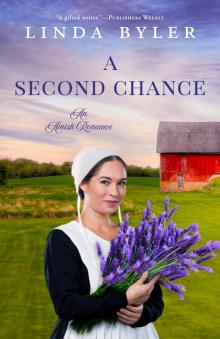 A Second Chance
A Second Chance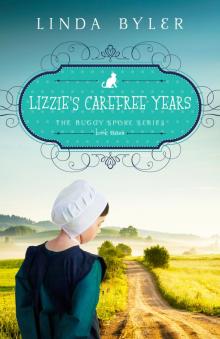 Lizzie's Carefree Years
Lizzie's Carefree Years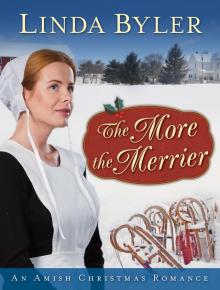 The More the Merrier
The More the Merrier Love in Unlikely Places
Love in Unlikely Places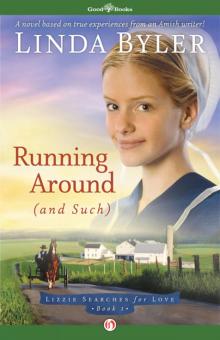 Running Around (and Such)
Running Around (and Such) Wild Horses
Wild Horses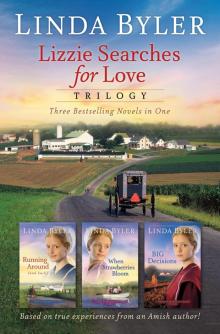 Lizzie Searches for Love Trilogy
Lizzie Searches for Love Trilogy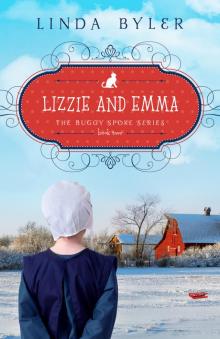 Lizzie and Emma
Lizzie and Emma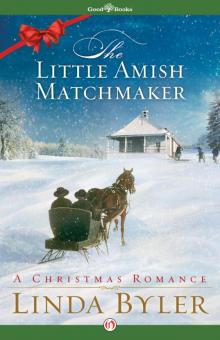 Little Amish Matchmaker
Little Amish Matchmaker The Witnesses
The Witnesses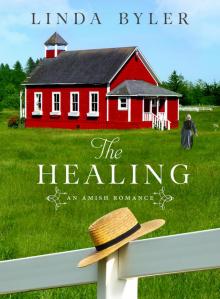 The Healing
The Healing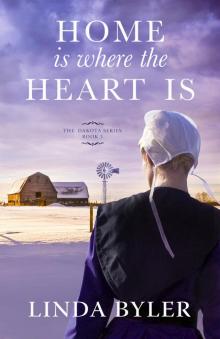 Home Is Where the Heart Is
Home Is Where the Heart Is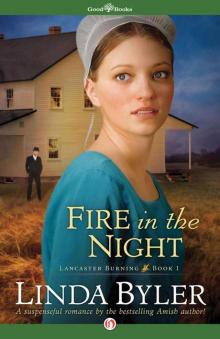 Fire in the Night
Fire in the Night When Strawberries Bloom
When Strawberries Bloom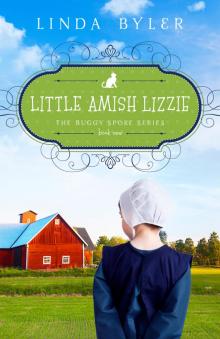 Little Amish Lizzie
Little Amish Lizzie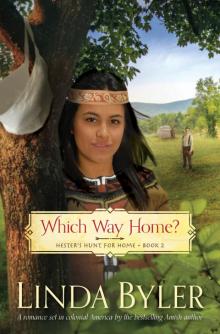 Which Way Home?
Which Way Home?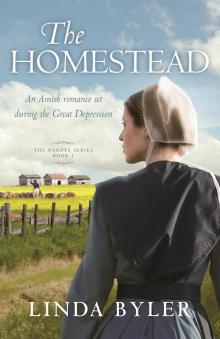 The Homestead
The Homestead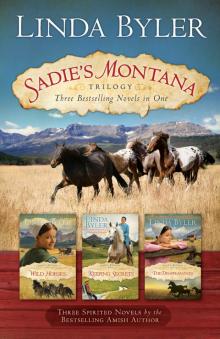 Sadie’s Montana Trilogy
Sadie’s Montana Trilogy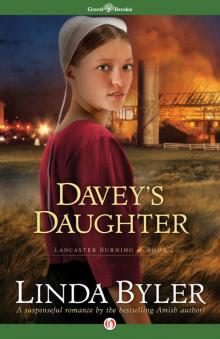 Davey's Daughter
Davey's Daughter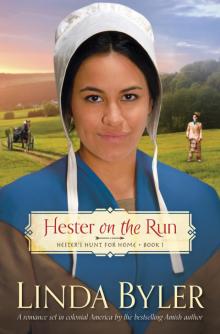 Hester on the Run
Hester on the Run Disappearances
Disappearances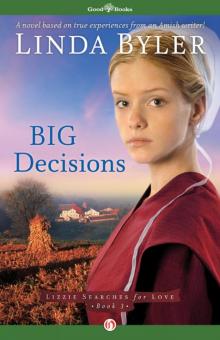 Big Decisions
Big Decisions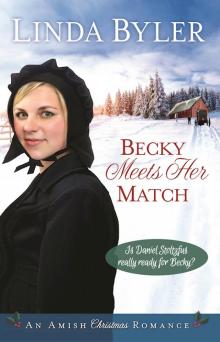 Becky Meets Her Match
Becky Meets Her Match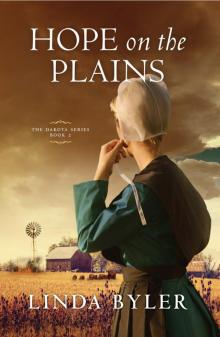 Hope on the Plains
Hope on the Plains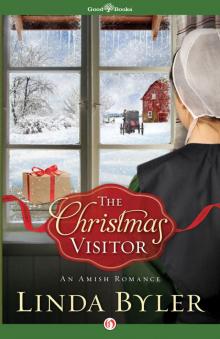 Christmas Visitor
Christmas Visitor